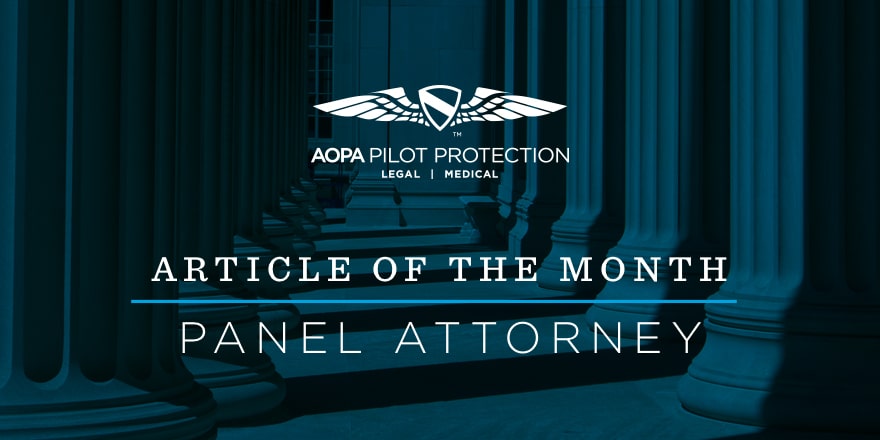Why Expunctions Are Critically Important To Pilots

John was given a roadside sobriety test which he passed. He was then driven to a hospital for a blood alcohol test. The result was .04, well below the legal limit. After being cautioned to be more careful, he was driven back to his car and was told he was free to go.
Since John was not convicted of any offense involving driving under the influence of alcohol or drugs, and did not have a suspension or other administrative action against him, he did not have to make a mandatory report to the FAA under FAR 61.15i. However, that is not the end of the story. While he likely will not face a suspension of his pilot certificate for failing to report a conviction, he could face emergency revocation of his FAA medical certificate and all of his FAA airman certificates if he fails to disclose this incident on his next application for an FAA Medical Certificate.
The FAA is perpetually engaged in a campaign to find and punish airmen who fail to disclose required information requested in Question 18v of the Application for an Airman Medical Certificate, and in particular information about any arrests, convictions or administrative actions involving alcohol or drugsii. The FAA Medical Application requires that applicants consent to a search of their driving records through the National Driver Register (NDR) system, which identifies potentially problematic drivers through records compiled from DMV and court records for states across the country. A preliminary hit triggers the FAA to investigate whether the NDR record pertains to the applicant in question or just someone with a similar name. Those records are then matched against the information from FAA Medical Certificate Applications to determine whether the matter was previously reported.
When FAA finds an applicant who has answered NO to question 18v when the answer should have been YES, the FAA response is swift and severe. The normal response of the FAA is to issue and serve an Emergency Order, immediately revoking all FAA airman certificates and medical certificates of the affected airman. For a professional pilot this means immediate removal from cockpit duties. The only recourse is to appeal the FAA’s order to the NTSB for a hearing, during which time the revocation remains in effect. The appeal must be filed within 10 days from the date the order was served and, unless the emergency timeframes are waived, the hearing must occur within 30 days from the date the appeal was received.
Generally, however, it is difficult to mount a successful defense in such a proceeding. Failure to read the question carefully is no excuse, and the FAA will generally not compromise or make deals to settle these cases other than to offer an opportunity to re-apply for airman certificates and ratings in less than one year. This merely shortens the time to take and pass the written and flight tests required for each revoked certificate and rating.
In view of the severity of the sanctions which can be imposed, this article is written to remind all persons applying for an FAA Medical Certificate to read all questions carefully, particularly question 18v, and provide truthful answers. As more fully set forth below, it is not just convictions which must be reported, and it is not just alcohol or drug related incidents which call for a YES answer. If fact, one may have to report matters which do not even involve an arrest.
Have you EVER had any arrest(s) and/or conviction(s) involving driving while intoxicated by, while impaired by, or while under the influence of alcohol or a drug? If so, that calls for a YES answer with an explanation.
This question specifically asks about arrests, not just convictions. Even if the arrest leads to no action, it must be reported. There may be instances where there is a reasonable basis not to report an arrest, but these are few and far between. For example, if one is stopped at a DUI checkpoint and released, this would not constitute an arrest. On the other hand, if one is stopped and subjected to a roadside sobriety test and released, this could well be considered an “arrest,” since that person was detained for a period of time before being free to leave. The FAA defines an “arrest” to include being detained by law enforcement. In case of doubt, it is probably better to report the incident with an explanation than try to explain it after an emergency revocation of all airman and medical certificates.
If there has been an arrest and/or conviction and a YES answer is provided on question 18v, it will probably be necessary to provide the medical examiner with documentation providing details of the arrest or conviction. Get these documents early and consider applying for a new medical certificate well in advance of the due date to allow time for an FAA review.
It’s not just an arrest for suspected driving under the influence of alcohol. Driving while impaired by a drug also calls for a YES answer.
Even if one is not under the influence of alcohol, one can be arrested for driving while under the influence of a drug, legal or illegal, including a prescription drug. Once again, this may trigger a YES answer to question 18v, and if so, it is important to obtain records of the arrest to take to the medical examiner when applying for a new medical certificate.
The legalization of marijuana in many states has probably led to many instances of persons not realizing that it is still illegal to drive while high. Being arrested for suspected driving while under the influence of marijuana can cause additional problems for an airman, because the FAA Medical Application asks whether the airman has used any illegal drugs within the previous two years iii. If an airman is arrested for suspected use of marijuana and answers NO to the question about whether you have used an illegal substance, this could cause the application to be flagged for further investigation. A YES to this question could raise questions about the applicant’s fitness to hold a medical certificate, and may require the applicant to submit to a drug test within 48 hours.
Have you EVER had any arrest(s) and/or convictions and/or administrative actions involving any offense(s) which resulted in the denial, suspension, cancellation or revocation of driving privileges or which resulted in attendance at an educational or a rehabilitation program?
This also calls for a YES answer and an explanation, even if it is totally unrelated to alcohol or drugs.
While driving on the New York State Thruway I saw signs warning drivers that three arrests for use of a cell phone while driving leads to loss of driving privileges. This would trigger the need for a YES answer on question 18v. Similarly, if one has driving privileges suspended or revoked for multiple speeding tickets, this must be reported.
It’s not just an arrest which calls for a YES answer.
Question 18v inquires about arrests, convictions and/or administrative actions. Many cities now have cameras to record drivers running red lights. If a driver has too many tickets from violations caught on camera, this may lead to suspension, limitation or revocation of driving privileges. If so, this calls for a YES answer on the Medical Application.
In Canada and some countries in Europe, there are cameras which are used to catch drivers for speeding. For some offenses involving very high speed, that jurisdiction may suspend or restrict the violator’s driving privilege in that jurisdiction without a hearing or subject to a right to contest the charge. In such case, this calls for a mandatory report on the FAA Medical application. A YES answer may not cause a problem with the issuance of the medical certificate. However, an improper NO answer could be grounds for revocation of all certificates and ratings.
CONCLUSION
Question 18v is rather comprehensive and requests information about ANY arrest, conviction and/or administrative action involving any charge or allegation of driving while impaired by or under the influence of alcohol or any drug. It also requests information about ANY administrative action involving one’s driving privileges or which results in attendance at an educational or administrative program. Read it carefully. The consequences of an improper NO answer are too steep to be ignored
i. FAR 61.15 states in pertinent part:
(c) For the purposes of paragraphs (d), (e), and (f) of this section, a motor vehicle action means:
(1) A conviction after November 29, 1990, for the violation of any Federal or State statute relating to the operation of a motor vehicle while intoxicated by alcohol or a drug, while impaired by alcohol or a drug, or while under the influence of alcohol or a drug;
(2) The cancellation, suspension, or revocation of a license to operate a motor vehicle after November 29, 1990, for a cause related to the operation of a motor vehicle while intoxicated by alcohol or a drug, while impaired by alcohol or a drug, or while under the influence of alcohol or a drug; or
(3) The denial after November 29, 1990, of an application for a license to operate a motor vehicle for a cause related to the operation of a motor vehicle while intoxicated by alcohol or a drug, while impaired by alcohol or a drug, or while under the influence of alcohol or a drug.
(e) Each person holding a certificate issued under this part shall provide a written report of each motor vehicle action to the FAA, Civil Aviation Security Division (AMC-700), P.O. Box 25810, Oklahoma City, OK 73125, not later than 60 days after the motor vehicle action. The report must include:
(1) The person’s name, address, date of birth, and airman certificate number;
(2) The type of violation that resulted in the conviction or the administrative action;
(3) The date of the conviction or administrative action;
(4) The State that holds the record of conviction or administrative action; and
(5) A statement of whether the motor vehicle action resulted from the same incident or arose out of the same factual circumstances related to a previously reported motor vehicle action.
ii. Question 18 of the FAA Medical Certificate Application, Form 8500.8, provides in pertinent part:
“18. Medical History. HAVE YOU EVER IN YOUR LIFE BEEN DIAGNOSED WITH, HAD, OR DO YOU PRESENTLY HAVE ANY OF THE FOLLOWING? Answer “yes” or “no” for every condition listed below. Arrest, Conviction and/or Administrative History—See Instructions Page
v. History of any (1) arrest(s), and/or conviction(s) involving driving while intoxicated, by, while impaired by, or while under the influence of alcohol or a drug; or (2) history of any arrest(s), and/or conviction(s), and/or administrative action(s) involving any offense(s) which resulted in the denial, suspension, cancellation or revocation of driving privileges or which resulted in attendance at an educational or a rehabilitation program.
On the Instructions Page for this question, it is stated in pertinent part:
If “yes” is checked, a description of the arrest(s), conviction(s) and/or administrative action(s) must be given in the EXPLANATIONS box. The description must include: (1) the alcohol or drug offense for which you were arrested and/or convicted or the type of administrative action involved (i.e. attendance at an alcohol treatment program in lieu of conviction; license denial, suspension, cancellation or revocation for refusal to be tested; educational safe driving program for multiple speeding arrests and/or convictions, etc.); (2) the name of the state or other jurisdiction involved; and (3) the date of the arrest(s), conviction(s) and/or administrative action(s). The FAA may check state motor vehicle driving licensing records to verify your responses….”
iii. Question 18(n) specifically asks: . “ HAVE YOU EVER IN YOUR LIFE BEEN DIAGNOSED WITH, HAD, OR DO YOU PRESENTLY HAVE ANY OF THE FOLLOWING?
(n) Substance dependence or failed a drug test ever; or substance abuse or use of illegal substance in the past two years.” (underlining added)
While marijuana may not be illegal in many states, it is still illegal under Federal law. Hence any use of marijuana in the United States within the past two years calls for a YES answer.
Jon Morse is an aviation attorney with more than 40 years of experience. He holds an Airline Transport Certificate and an expired Certified Flight Instructor Certificate.
TELL US ABOUT YOUR CASE
Use the form to request your free consultation to discuss your case with one of our attorneys. The use of this form does not establish an attorney-client relationship.
The information on this website is for general information purposes only. Nothing on this site should be taken as legal advice for any individual case or situation. This information is not intended to create, and receipt or viewing does not constitute, an attorney-client relationship.




